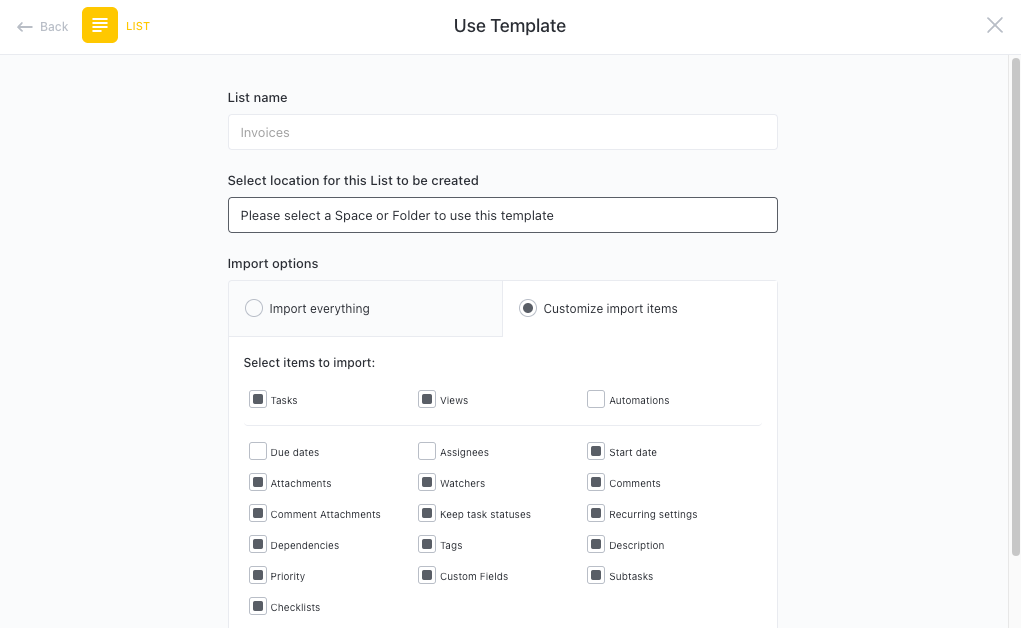Running a charity organization is no easy task. With so many moving parts and important decisions to be made, having a well-organized and productive meeting is crucial. That's where ClickUp's Charity Organizations Meeting Agenda Template comes in.
This template is specifically designed for charity organizations to streamline their meetings and ensure that nothing falls through the cracks. With this template, you can:
- Create a clear structure and order of topics to be discussed
- Address important matters related to fundraising, program coordination, and volunteer management
- Plan and strategize for the future of your organization
Take your charity organization to the next level with ClickUp's Charity Organizations Meeting Agenda Template. Start making your meetings more effective and productive today!
Benefits of Charity Organizations Meeting Agenda Template
Charity Organizations Meeting Agenda Template provides numerous benefits to charity organizations:
- Streamlines meeting processes, making it easier to organize and prioritize topics
- Ensures that all relevant topics are discussed and no important matters are overlooked
- Increases meeting efficiency by providing a clear structure and time allocation for each agenda item
- Facilitates collaboration and participation among team members by allowing them to contribute to the agenda beforehand
- Promotes accountability by keeping a record of meeting outcomes and action items for follow-up.
Main Elements of Charity Organizations Meeting Agenda Template
ClickUp's Charity Organizations Meeting Agenda Template is designed to help you plan and organize your charity organization's meetings effectively:
- Custom Statuses: Track the progress of each agenda item with custom statuses such as Pending, In Progress, and Completed.
- Custom Fields: Use custom fields to capture important details for each agenda item, such as Responsible Person, Time Allotted, and Discussion Points, ensuring that all necessary information is included.
- Different Views: Access various views to suit your meeting needs, including a List View to see all agenda items in a structured list format, a Board View for a visual representation of agenda items, and a Calendar View to schedule and track meeting dates.
- Collaboration Tools: Utilize ClickUp's collaboration features like real-time commenting and task assignment to ensure seamless communication and delegation of tasks within your organization.
How to Use Meeting Agenda for Charity Organizations
When organizing a meeting for a charity organization, it's important to have a clear agenda to ensure that everyone stays on track and that all important topics are addressed. Here are four steps to effectively use the Charity Organizations Meeting Agenda Template in ClickUp:
1. Define the meeting objectives
Before creating the agenda, it's essential to determine the main objectives of the meeting. What are the key topics that need to be discussed? Are there any decisions that need to be made? Clearly defining the meeting objectives will help set the direction and focus of the agenda.
Use the Goals feature in ClickUp to outline the specific objectives for the meeting, such as discussing upcoming fundraising events or reviewing the progress of ongoing projects.
2. Organize the agenda topics
Once you have identified the meeting objectives, it's time to organize the agenda topics in a logical order. Start with any time-sensitive or urgent matters, followed by important discussions or decisions. It's also helpful to consider the flow of the meeting and group related topics together.
Use the Board view in ClickUp to create different columns for each agenda item, and easily drag and drop topics to reorganize them if needed.
3. Assign time slots
To ensure that the meeting stays on schedule, assign time slots to each agenda item. Estimate how much time should be allocated for each topic based on its importance and complexity. Be realistic with the time allocation, allowing for necessary discussion and decision-making without rushing through important matters.
Use the Calendar view in ClickUp to assign specific time slots to each agenda item, making it easy for participants to see the meeting schedule at a glance.
4. Share and review the agenda
Once the agenda is finalized, it's crucial to share it with all meeting participants in advance. This gives everyone an opportunity to review the topics and come prepared with any necessary information or materials. Encourage participants to provide input or suggest additional agenda items to ensure that all relevant topics are addressed.
Use the Email feature in ClickUp to send the meeting agenda to all participants, along with any attachments or additional instructions. You can also use the Comment feature to gather feedback or input from participants before the meeting.
By following these four steps and utilizing the Charity Organizations Meeting Agenda Template in ClickUp, you can ensure that your meetings are well-organized, productive, and focused on achieving the objectives of your charity organization.

Get Started with ClickUp’s Charity Organizations Meeting Agenda Template
Charity organizations can use this Meeting Agenda Template to streamline their meetings and ensure all important topics are covered.
First, hit “Add Template” to sign up for ClickUp and add the template to your Workspace. Make sure you designate which Space or location in your Workspace you’d like this template applied.
Next, invite relevant members or guests to your Workspace to start collaborating.
Now you can take advantage of the full potential of this template to run effective meetings:
- Use the Agenda View to create a detailed outline of topics to be discussed, including fundraising updates, program coordination, volunteer management, and strategic planning
- The Action Items View will help you assign tasks and track progress on important action items discussed during the meeting
- Utilize the Decision Log View to record key decisions made during the meeting for future reference
- The Notes View will allow you to take meeting minutes and capture important discussions and ideas
- Organize agenda items into different categories to keep the meeting organized and focused
- Assign meeting roles to ensure everyone knows their responsibilities
- Monitor and analyze meeting outcomes to improve future meetings and overall organizational efficiency








